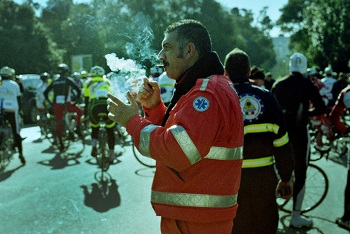Paramedics face a lot of on-the-job stress, stepping into terrifying situations and being tasked with caring for the seriously injured and their families. Sadly, a lot of them turn to smoking to cope.
 Medical professionals know the risks of smoking better than anybody, but that doesn’t stop all of them from doing it. The idea that people like paramedics – who will have undoubtedly attended fires caused by cigarettes and have a good understanding of the health consequences of smoking – would take up the habit themselves may seem unusual. However, like for many other groups of smokers, on-the-job stress can make day-to-day life a challenge, and some turn to cigarettes, alcohol or other substances to cope.
Medical professionals know the risks of smoking better than anybody, but that doesn’t stop all of them from doing it. The idea that people like paramedics – who will have undoubtedly attended fires caused by cigarettes and have a good understanding of the health consequences of smoking – would take up the habit themselves may seem unusual. However, like for many other groups of smokers, on-the-job stress can make day-to-day life a challenge, and some turn to cigarettes, alcohol or other substances to cope.
Do Paramedics Smoke? The Statistics
Smoking rates among paramedics aren’t vastly higher than smoking rates among other groups, but more paramedics smoke than you may expect somebody with medical knowledge to. One study looked at records from almost 20,000 emergency medical service workers in the U.S., and found that around 17% were classified as current smokers.
Another study looked at paramedics in Quebec, Canada, and found similar smoking rates to those found in the U.S.-based research, with 16.7% of females and 14.3% of males reporting smoking at least one cigarette per day. This study also looked at smoking rates based on the number of years working as a paramedic, and found that those in the job for between 10 and 19 years smoked more than those who’d been in the job for under 10 years, and workers in the job for over 20 years smoked the most.
Mental Health Issues in Emergency Medical Services: Why Paramedics Smoke
The apparent contradiction between working in medicine and making such a harmful lifestyle choice isn’t as confusing as it may appear. Paramedics head into scenes of fatal accidents and have to cut through the carnage in order to help as many people as possible. They care for people who’ve caused fatal accidents. They face more distressing situations on a day-to-day basis than most people will throughout their entire lives.
This job stress takes its toll on provider’s mental health. The National Emergency Medical Services Management Association produced a white paper on the issue, which points out that while evidence on these points is limited, there is evidence that paramedics report high levels of stress and are at much greater risk for suicide than the general population.
One survey elicited over 4,000 responses, and found that around 3,400 of them met the criteria for “critical stress.” This is stress that has a significant impact on the individual, whether resulting from a single incident or an accumulation of stress over time. Another survey found that 37% of emergency medical services providers had contemplated suicide, and 6.6% had actually attempted suicide. These rates are around 10 times higher than the general population.
When people are under great deals of stress, they are much more likely to smoke and they’re less likely to be able to quit. Smoking, although ultimately harmful and a poor coping mechanism for stress, bring superficial relief and eases people in times of stress. As with other members of emergency services such as firefighters, the extreme levels of job-related stress experienced has a big part to play in smoking rates among paramedics.
Helping Paramedics Go Smoke-Free
While the psychological stress from working as a paramedic is understandable, smoking is not only a cause of a huge range of serious health problems, it also does very little to help with stress. While nicotine can produce a superficial sense of relief and relaxation, the underlying causes of stress still exist, and any relief from smoking is only temporary.
Paramedics who smoke quickly find themselves reaching for the next cigarette, and quickly become addicted. Upon trying to quit, withdrawal sets in and often leads to more stress and irritation.
That’s why paramedics who smoke should make quitting a priority. Paramedics can be helped to quit smoking the same ways as anybody else, whether through medicines like Chantix, nicotine replacement therapies or alternative nicotine products such as e-cigarettes or snus.
However, due to the psychological issues paramedics experience and the ongoing job-related stress, counseling or behavioral support can be a particularly useful intervention. Counseling in particular can not only help address nicotine addiction and provide tips for quitting smoking, it also helps paramedics learn healthy coping mechanisms for their jobs.
Stopping smoking should remain a priority, but with such high rates of attempted suicide among paramedics, the extra emotional and psychological support offered by counseling can make a bigger difference in their lives than just quitting smoking.
The issues surrounding paramedics and smoking are an important reminder that all groups are susceptible to smoking, even those with an understanding of the medical consequences, but particularly those under a great deal of stress who don’t have access to psychological support. It’s easy to lean on a poor coping mechanism when nobody has helped you to learn more effective and less harmful ones.





